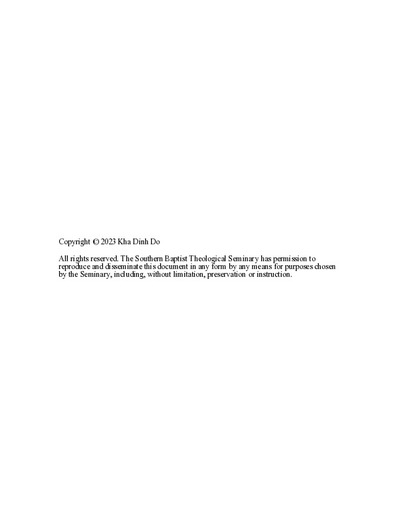Singing the Self: Exploring the Role of Congregational Song in Identity Formation
Abstract
This dissertation evaluates aspects of identity formation research, drawn fromthe social sciences, and interprets the findings from a Christian theological perspective. I
argue that liturgical practices provide believers, individually and corporately, an avenue
for identity-formation within the context of worship, for in worship Christians rehearse
the past and hope for the future with a redemptive lens. Finally, the dissertation analyzes
the themes of self-identity in an identified core repertory of the most-used contemporary
congregational worship songs in evangelical churches from 2005 through 2020, and
argues that congregational songs play a unique role in identity formation in a postmodern
society.
Chapter 1 introduces the argument of the dissertation. Chapter 2 charts thelandscape of contemporary self-identity by evaluating Anthony Giddens’s concept of the
“reflexive self,” which liberates individuals to construct self-identity apart from tradition
and culture. Then, exploring the opportunities and limitations of reflexivity, it presents an
alternative vision of reflexivity that locates the necessity for Christian gatherings,
liturgies, and congregational singing. It concludes by suggesting Jeremy Pierre’s
paradigm of the dynamic heart, and the role of faith provides the biblical basis for how
self-identity is both received and shaped. Chapter 3 traces the role of relationships in identity and engages with
reflections on selfhood through the works of Charles Taylor. In addition, the chapter
discusses relational practices within the liturgy. Portrayals of relationships are also
examined in Contemporary Worship Music (CWM) in three categories—God, others, and
self. Chapter 4 examines the role of emotions in identity by surveying Erik Erikson’s
human development and psychosocial identity theory, explores the liturgical
implications, and establishes a taxonomy for evaluating “conflict” and “resolute”
emotions in CWM. Chapter 5 examines the theme of status coined by psychologist,
James Marcia, discusses lament and dedication as liturgical expressions of status, and
establishes a taxonomy for evaluating “exploration” and “commitment” language in
CWM.Chapter 6 proposes general implications for worship planners and suggested
areas for further study related to this topic.

